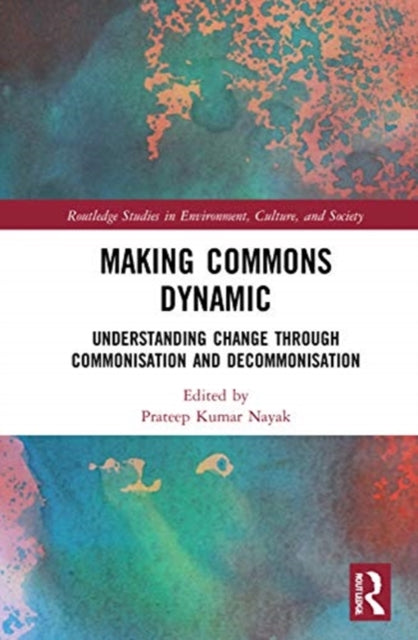Shulph Ink
Making Commons Dynamic: Understanding Change Through Commonisation and Decommonisation
Making Commons Dynamic: Understanding Change Through Commonisation and Decommonisation
YOU SAVE £6.96
- Condition: Brand new
- UK Delivery times: Usually arrives within 2 - 3 working days
- UK Shipping: Fee starts at £2.39. Subject to product weight & dimension
Bulk ordering. Want 15 or more copies? Get a personalised quote and bigger discounts. Learn more about bulk orders.
Couldn't load pickup availability
- More about Making Commons Dynamic: Understanding Change Through Commonisation and Decommonisation
Making Commons Dynamic explores the empirical basis of theorising the concepts of commonisation and decommonisation to understand commons as a process and offers analytical directions for policy and practice to maintain commons as commons. It draws from 20 geographically diverse empirical cases involving a wide range of commons, and is a transdisciplinary endeavour with contributions from scholars from various fields.
Format: Hardback
Length: 354 pages
Publication date: 02 March 2021
Publisher: Taylor & Francis Ltd
Making Commons Dynamic delves into the complexities of sustaining the commons across local to global scales, offering a comprehensive examination of the empirical foundations of theorising commonisation and decommonisation as key approaches to understanding commons as a dynamic process. Through a series of insightful chapter contributions, the book explores how natural resources are subjected to commonisation and decommonisation processes driven by a multitude of internal and external factors, ultimately shaping their governance across diverse geographical and temporal contexts. Drawing from a rich array of geographically diverse empirical cases spanning 20 countries in North, South, and Central America, South- and South-East Asia, the book offers a comprehensive examination of a wide range of commons, including fisheries, forests, grazing, wetlands, coastal-marine, rivers and dams, aquaculture, wildlife, tourism, groundwater, surface freshwater, mountains, small islands, social movements, and climate.
This transdisciplinary endeavour brings together scholars from a diverse range of fields, including geography, history, sociology, anthropology, political studies, planning, human ecology, cultural and applied ecology, environmental and development studies, environmental science and technology, public policy, Indigenous/tribal studies, Latin American and Asian studies, and environmental change and governance. The book features contributions from both academic experts and community members, NGOs, practitioners, and policymakers, ensuring a holistic and multifaceted perspective on the challenges and opportunities associated with sustaining the commons.
The chapters in Making Commons Dynamic provide valuable insights into commonisation–decommonisation processes and their implications for commons governance. They shed light on the ways in which natural resources are transformed into shared resources, often through processes of commodification, privatisation, and regulation. At the same time, these chapters also highlight the challenges of maintaining commons as commons, particularly in the face of growing economic pressures, urbanisation, and climate change.
One of the key themes explored in the book is the role of multi-level drivers in shaping commonisation and decommonisation processes. These drivers include political, economic, social, cultural, and ecological factors, each playing a distinct role in determining the fate of commons. For example, political decisions and policies can influence the extent to which natural resources are protected and managed as commons, while economic incentives and market forces can drive decommonisation and privatisation. Similarly, social norms, cultural practices, and ecological processes can either reinforce or undermine the common ownership and management of resources.
Another important aspect of the book is its examination of the implications of commonisation and decommonisation for commons governance. The chapters highlight the need for effective governance mechanisms that can balance the interests of different stakeholders and ensure the sustainable use and management of commons. This includes the development of inclusive and participatory decision-making processes, the establishment of effective institutions and policies, and the promotion of local and community-based initiatives.
Furthermore, the book recognises the importance of recognising and respecting the diverse cultural and ecological values associated with commons. It advocates for a more inclusive and pluralistic approach to commons governance that recognises the diverse perspectives and needs of different communities and groups. This includes the recognition of Indigenous/tribal knowledge systems and practices, the promotion of gender equality and social justice, and the integration of environmental and social considerations into decision-making processes.
In conclusion, Making Commons Dynamic is a groundbreaking work that offers a comprehensive and interdisciplinary understanding of the commons as a dynamic process. Through its examination of commonisation–decommonisation processes and their implications for commons governance, the book provides valuable insights and analytical directions for policymakers, practitioners, and scholars seeking to maintain and enhance the sustainability of the commons across local to global scales. By drawing from a rich array of empirical cases and engaging with a diverse range of perspectives, the book contributes to the growing body of knowledge on the commons and offers a roadmap for building a more resilient and sustainable future.
Weight: 718g
Dimension: 159 x 241 x 31 (mm)
ISBN-13: 9780367138004
This item can be found in:
UK and International shipping information
UK and International shipping information
UK Delivery and returns information:
- Delivery within 2 - 3 days when ordering in the UK.
- Shipping fee for UK customers from £2.39. Fully tracked shipping service available.
- Returns policy: Return within 30 days of receipt for full refund.
International deliveries:
Shulph Ink now ships to Australia, Belgium, Canada, France, Germany, Ireland, Italy, India, Luxembourg Saudi Arabia, Singapore, Spain, Netherlands, New Zealand, United Arab Emirates, United States of America.
- Delivery times: within 5 - 10 days for international orders.
- Shipping fee: charges vary for overseas orders. Only tracked services are available for most international orders. Some countries have untracked shipping options.
- Customs charges: If ordering to addresses outside the United Kingdom, you may or may not incur additional customs and duties fees during local delivery.


